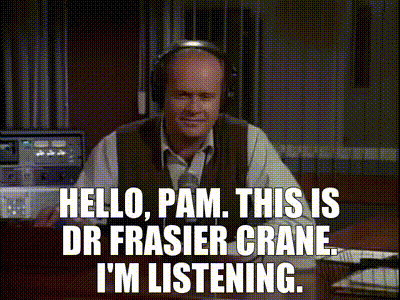You Need To Calm Down
Scared of flying? You're not alone. Read on to discover techniques using apps and breathing exercises that have helped others overcome fear of flying and enjoy air travel.

DISCLAIMER: Red Solo Traveler is a reader-supported publication. This page contains affiliate links and banners. If you choose to make a purchase after clicking a link, I may receive a commission at no additional cost to you. Thank you for your support!
In the summer of 2017, I flew to Seattle with some friends for our friend’s wedding. We would all coordinate our respective flight plans, and accommodations, and this would be a few months out from the wedding. I remember the time fondly, as a couple I am friends with was having some severe anxiety with flying. The man in the couple was having a difficult time because he liked having control of the vehicle, and the woman in the couple was having a hard time because she was slightly claustrophobic. We got to the airport, and I stayed with both every step of the way. I was their guide and I was happy to do it. I knew what to do, and was able to keep them calm throughout the flight and keep things as light as it could be. This story is not meant for me to pat myself on the back, as I hate when others do that. It’s meant to highlight and explore a very real issue with some people who decide to travel. So, you finally took my advice and booked that solo trip, and that trip requires flying. Now, how do you overcome the anxiety and fear associated with flying?
High Anxiety
The specific phobia is known as “aerophobia” or “aviophobia”. It is mostly associated with anxiety, but may include chills, disorientation, rapid heart rate, and gastrointestinal distress. But what exactly causes this fear? VeryWellMind provides a logical explanation.
The exact causes of a fear of flying are not known, but a number of different factors may play a role. One review found that the fear varies greatly from one individual to the next and is influenced by a complex array of physiological, psychological, and social factors that are unique to each person. Some of these factors may include:
Experiencing a traumatic flight or plane crash: Even watching extensive news coverage of airline disasters can be enough to trigger a fear of flying. For example, many people experienced at least a minimal fear of flying in the wake of the September 11 attacks.
Environment: If your parents also had a fear of flying, you may have internalized their trepidation. This is a particularly common cause of aerophobia in children but affects many adults as well. You might pick up the fear of flying from another relative or friend, but parents seem to have the biggest influence on phobias.
Other related circumstances: Your aerophobia might also be rooted in an entirely different conflict. For example, a fear of flying that develops soon after a job promotion that requires travel could be caused by concerns about the job itself or its impact on your daily life. Likewise, children who must fly frequently to visit divorced parents sometimes develop aerophobia as a coping mechanism for the trauma of the divorce.
Now, i’ll make this crystal clear, I am not a psychiatrist nor do I play one on TV, but trauma associated with flying seems to be the underlying theme to all of this. My friend’s fear of flying was more associated with claustrophobia, but that also is related as well. You’re also not alone! Between 25-40% of airline passengers experience some form of anxiety while flying. So, how do you overcome it?

Let It Go
It is possible that you may or may not be able to conquer your fear of flying, but you can certainly take steps to handle it. One approach would be to address the underlying symptom and concentrate on soothing yourself by practicing deep breathing techniques. NBC News provides a comprehensive explanation of this method:
If you’re up in the air and you begin to feel panicked, redirect your thoughts to your breathing. “Anxiety often leads us to breathe shallowly and rapidly,” says Gilliland. “Slow, big breaths can help us relax the body, and the mind usually follows.”
Nadrich recommended breathing in through your nose for two counts, holding for two counts, gently exhaling for four counts, and then holding for one count. Repeat five to 10 times. Deliberate breathing puts you in control of your body and your mind, allowing you to be the observer instead of the reactor.
According to The American Institute of Stress, "deep breathing increases the supply of oxygen to your brain and stimulates the parasympathetic nervous system, which promotes a state of calmness." Focusing on your breath also shifts your focus from your mind to your body, which can help quiet racing thoughts.
Whenever I find myself feeling stressed, I have found that taking a few deep breaths is truly effective. It helps to clear my mind and enables me to think more logically. To manage stress, I regularly practice a simplified version of meditation on a weekly basis. Additionally, before flights, I occasionally engage in my own form of meditation. Clearing your mind is undoubtedly one of the most beneficial things you can do. Furthermore, it is important to give yourself some time and find distractions. Since there is no wifi on flights (unless you choose to pay for it), you can take advantage of this opportunity to load up on books, podcasts, movies, and shows on your tablet or phone. Personally, I often utilize this time to watch a movie that I haven't seen in a while or catch up on my favorite shows. Comedy has proven to work wonders for me during moments like these!

There’s An App For That?
When traditional breathing techniques fail to bring relief, turning to apps can be a valuable last option that can potentially save the day. It is widely acknowledged that knowledge is power, and the prevailing agreement is that air travel is the safest mode of transportation. Surprisingly, even turbulence poses no significant threat! In fact, AskThePilot.com provides an in-depth explanation of what turbulence truly entails, debunking any misconceptions you may have had:
Turbulence is an aggravating nuisance for everybody, including the crew, but it’s also, for lack of a better term, normal. From a pilot’s perspective it is ordinarily seen as a convenience issue, not a safety issue. When a flight changes altitude in search of smoother conditions, this is by and large in the interest of comfort. The pilots aren’t worried about the wings falling off; they’re trying to keep their customers relaxed and everybody’s coffee where it belongs. Planes themselves are engineered to take a remarkable amount of punishment, and they have to meet stress limits for both positive and negative G-loads. They can withstand an extreme amount of stress, and the level of turbulence required to dislodge an engine or cause structural damage is something even the most frequent flyer — or pilot for that matter — won’t experience in a lifetime of traveling.
You might find relief in the apps you're currently using. Apps like FlyingCalmly and SimpiFly provide turbulence forecasts, interesting articles, videos, and podcasts. Some even allow you to chat with a pilot! Additionally, there are apps like SkyGuru, SOAR, and others that will inform you in advance about your flight. However, if you simply need to calm down, the Calm app is widely known for its meditation exercises and soothing music to help manage stress. Lastly, if you're a subscriber to SiriusXM, Spotify, or Apple Music, you can find curated "sleep music" channels that can both distract and relax you during your flight.

Closing Thoughts
I recently bumped into the same friend at an event, and he excitedly shared with me that he and his girlfriend are planning a west coast road trip at the end of the year. I offered my assistance, but he assured me he would manage just fine. He mentioned that he needed to overcome his fear of air travel, and that realization alone was a huge relief for him. While he tried to thank me for my support, I humbly declined the credit, although I did appreciate his gratitude. Having a friend who understands your fears and experiences can be incredibly comforting. Unfortunately, if you’re traveling on your own, you won’t have the opportunity to have a friend with you, so finding ways to keep yourself calm is essential but absolutely possible. If you find yourself traveling solo, there are various techniques such as breathing exercises, flight-related apps, calming music, that can help you stay composed and relaxed during your journey. Remember, you are capable of overcoming your fears and embarking on that flight to your destination. Stay positive!
